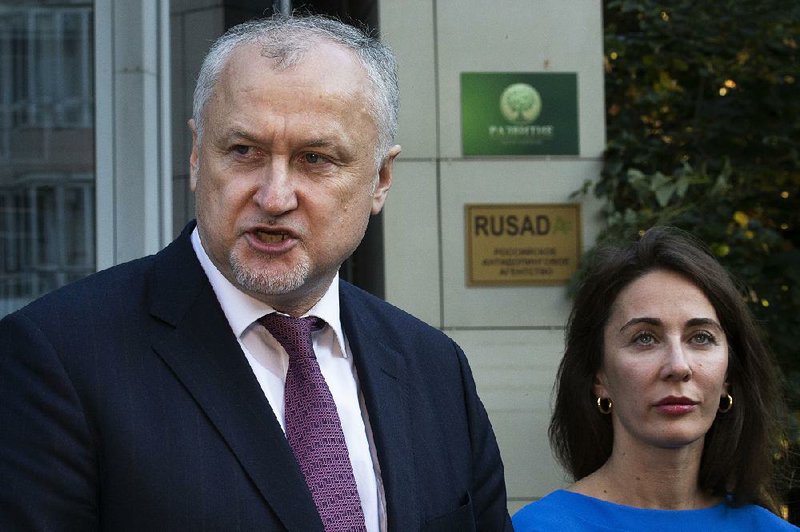The World Anti-Doping Agency declared Russia's scandal-ridden drug-fighting operation back in business Thursday, a decision designed to bring a close to one of sports' most notorious doping scandals but one bitterly disputed by hundreds of athletes and described as "treachery" by the lawyer for the man who exposed the corruption.
On a 9-2 vote, the executive committee took the advice of the agency's compliance review panel and declared RUSADA as having satisfied conditions of reinstatement that were gradually softened over the summer.
In most tangible ways, the decision doesn't change much: RUSADA has been up and running for a while, bringing one of the world's largest testing programs back on line with the help of officials from Britain and elsewhere. And Russia's Olympic committee was brought back into the fold after the Pyeongchang Olympics, where athletes who could prove they were clean were able to compete as "Olympic Athletes from Russia."
But RUSADA's reinstatement now clears the country to again bid for major international events -- although soccer's World Cup was held there this summer despite that restriction.
It also clears a major hurdle for Russia's track team to be declared compliant by that sport's international governing body, one of the few to take a strong, consistent stand against doping.
Perhaps most importantly, hundreds of athletes and dozens of world anti-doping leaders see it as a stinging rebuke to the ideal of fair play.
"WADA's decision to reinstate Russia represents the greatest treachery against clean athletes in Olympic history," said Jim Walden, the attorney for Grigory Rodchenkov, the former Moscow lab director who exposed much of the Russian scheme.
WADA had been telegraphing the move since Sept. 14, when it released the recommendation of its compliance review committee. Olympic champion Beckie Scott resigned from that committee afterward.
"I'm profoundly disappointed," Scott said to Canadian broadcaster CBC after the decision. "I feel this was an opportunity for WADA, and they have dealt a devastating blow to clean sport. I'm quite dismayed."
Even in Russia, where the news was welcomed, it came with a sense that there's still work to be done.
"These questions will always follow us," said RUSADA CEO Yuri Ganus, whose appointment to the job was part of the housecleaning at the agency that WADA demanded. "These aren't the kind of skeletons which can lie unnoticed in the closet. These are the skeletons which will be banging on the closet door all the time."
The two biggest roadblocks to RUSADA's reinstatement involved the country accepting findings from a report by investigator Richard McLaren that concluded the government had engineered the doping scandal to win medals at the Sochi Olympics. It also involved Russia agreeing to hand over a trove of data and samples that could be used to corroborate potential doping violations that stemmed from the cheating.
Over a summer's worth of correspondence between WADA leaders and Russia's sports minister about how to bridge the gap, a pattern emerged of WADA backing down from its initial requirements and, at one point, essentially asking Russia what it would be willing to say in a letter designed to satisfy the WADA review committee.
"We think that a small addition to the letter, if acceptable to you, could ensure that the letter is well received ... and that a positive recommendation is provided," WADA CEO Olivier Niggli wrote to sports minister Pavel Kolobkov in May in a letter obtained by BBC Sport.
In the end, Russia agreed to accept findings of an IOC-commissioned report that put less onus on the Russian government for the scheme, a move that Rodchenkov said earlier this week was done "for the pure purpose of protecting their top-level apparatchiks who destroyed the Olympic Games in Sochi."
Russia also agreed to hand over the samples and data by Dec. 31. If it does not, RUSADA will again be declared noncompliant.
Critics said reinstating RUSADA before obtaining the data only amounts to accepting another promise from a country that hasn't kept many over the five-year course of the scandal.
Sports on 09/21/2018

